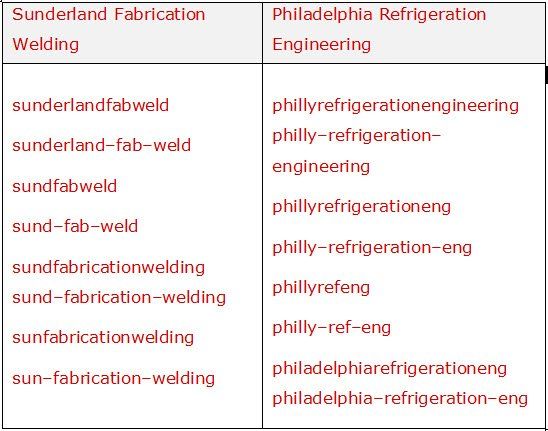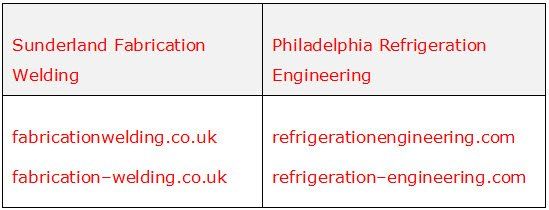Choosing the Right Domain Name:
a Marketing Perspective
all you need to know about domain names
(and some you don't need to know, but is interesting anyway)
CHAPTER 3.04
CHOOSING THE RIGHT DOMAIN NAME FOR AN EXISTING ORGANIZATION
Before I start this section, let me say that I do appreciate that company names and trading names might not be the same - Alan Charlesworth Ltd trading as Wonder Products, for example. In such cases this chapter will consider only the trading name - in this example, Wonder Products. It is also the case that some elements of this section will apply equally to the next one which looks at choosing domain names for new companies.
For both existing and new organizations, the decision on the domain name that will represent it on the Internet will be largely influenced by the online objectives of that organization. For the small business that trades successfully in its local area through offline marketing, a website might add little to that marketing effort - and so the domain name is not that important. Don't get me wrong, it is still important to make the right decision - but spending thousands of pounds to buy in a generic-term domain is not really a viable option in this scenario. Neither is the decision on using a hyphen because the 'all-one-word' version has been registered going to be something that keeps the owner awake at night. At the opposite end of the spectrum is the new online-only business. For that organization the domain name could be the difference between success and failure.
There are currently more existing businesses that have yet to move online than there are new businesses (around 80% of US small businesses still have no web presence), so this section will probably be the most read in the book. However, the guidelines I offer here are equally relevant to the new business - the subject of the next section.
I have always been a proponent of naming a business with a combination of its location or owner and what it does. If this is the case, then the best domain name option is to simply take the company name, and add the suitable suffix. So if our business makes toys in York and is called York Toys Ltd, we simply combine the two words and add a suffix - yorktoys.co.uk. Similarly, Alan's Toys Ltd would use alanstoys.co.uk. A further option is to combine generic terms with places. For example, how many places have a 'station taxis' (cabs) or 'sea view hotel'? Yet few, if any, locations will have more than one business with the same name. So we can have stationtaxismanchester.co.uk, stationcabschicago.com - or for that matter, liverpoolstationtaxis.co.uk or bostonstationcabs.com[The domain name of the biggest taxi firm in my home city of Sunderland is stationtaxis.com. I wonder who advised them to register such a good generic domain back around 1997? OK, it was me.]. Because you have already read the section on suffixes, I don't need to remind you that for all the variations on a theme as described here you can also use any suffix that is feasible.
DOMAIN NAMES IN PRACTICE : apostrophes
That apostrophes cannot be used in domain names should not be a problem when selecting a name. The reason is twofold; (i) it has become accepted practice to register terms [that include an apostrophe] as domain names without that punctuation mark, and (ii) sadly, few people actually know how to use apostrophes correctly, so their absence in a domain name will not even be noticed by most.
Another twist on the add-the-location route is to insert the two-character preposition 'of'. This is not unheard of with offline company names where the company is named after a person with a common name. For example, a firm owned by Gerald Hallam that is based in Immingham might be called Hallam's of Immingham - so differentiating it from any other firm that trades under the name Hallam's. If the offline name is Hallam's of Immingham then the chances of that domain name being already registered is minimal. But if they did trade simply as Hallam's they have long since missed out on that domain name (all popular suffixes based on hallam and hallams have been registered), so for their website, hallamsofimmingham.com is an effective option.
There are occasions when the full name and trade of the business are simply too long to be acceptable as a domain name (realistically, anything over twenty characters is questionable). A fabrication welding company from Sunderland, for example, should think seriously before registering sunderlandfabricationwelding.co.uk. Similarly, a refrigeration engineering business in Philadelphia might consider philadelphiarefrigerationengineering.com somewhat unwieldy.
So what to do? One option would be to register a name - nickname - by which the company is commonly known. Organizations with long names are frequently given shorter, more convenient, titles. Such names can be official (the initial letters of the company name, perhaps) or a colloquial abbreviation (Jag, for Jaguar cars, for example). For my fictional Sunderland Fabrication Welding and Philadelphia Refrigeration Engineering I'd start by going down the obvious route of their initials as a domain name. Sadly few, if any, three or four character domain names are still available. In this case sfw.co.uk has been registered by SF Williams Ltd and pre.com (though unused) has been registered by the Harris Corporation of Florida.
Other possibilities for my made-up companies might come from shortening elements of their names as shown in the following table. Note that in this exercise I am concentrating on the actual name only - all of the following can be used with different suffixes.
Note that I picked Philadelphia simply because it was the longest American place name that I could think of (watching 'Cold Case' was probably an influence!). That Philadelphia is commonly, and easily, abbreviated to 'Philly' makes many of the suggestions for the refrigeration company far more acceptable than those where Sunderland is rather unnaturally reduced to 'Sund' or 'Sun' - not something that is common practice offline.
Unfortunately, however, none of this list look right. I wish I could be more objective and offer a checklist of points to tick-off in order to get the right name, but there is no such list. It is a subjective call. They are just not right. Like the discipline of marketing as a whole, choosing a domain name is part art, part science - this is where the art aspect comes in.
So what would I suggest if the owners of these made-up companies knocked on my door and asked my advice? Perhaps taking the route of a generic phrase, for example:
Of these, only the two .co.uk names are still available. Generally speaking, all generic words and useful combinations thereof have already been registered, but there are some combinations still out there, particularly in the more traditional trades that have been relatively late in joining the information superhighway.
However, to have a website sitting on such a generic domain will result in the organization's brand being divided - in marketing terms, a serious error.
Given that the best combinations of 'fabrication welding' and 'refrigeration engineering' are no longer available, what domain names should my two fictitious firms go for?
Well - remember those two suggestions that I dismissed so lightly at the beginning of this example because they were too long? You will recall I said 'realistically anything over twenty characters is questionable' - and OK, both
sunderlandfabricationwelding.co.uk
and
philadelphiarefrigerationengineering.com
might both be rather long, but they are probably the best options. Why? you might ask. To which I would argue that in these two examples both of these suggested domain names tell you exactly what the company does and where it is from. For me, the advantages of that trumps the 'over-long' issue.
DOMAIN NAMES IN PRACTICE : less than mobile
The North East Mobility Warehouse has the domain name northeastmob.com. This company is local to me in the North East of England, but they certainly didn't ask me for advice before choosing their domain name. Let's start with the suffix - a .com for a company whose customer base must be in its own locale? The actual name sounds as though it should belong to the website of a group of football hooligans. In Yellow Pages the company is listed as North East Mobility Warehouse. When you ring them, the greeting is 'North East Mobility'. So where does northeastmob.com come from? I can only think that they (or their advisers) thought a shorter name would be better. Superior options? It's a small company, so I don't think multiple registrations are necessary. I would go for NorthEastMobilityWarehouse.co.uk or if you want a shorter version, and particularly if the company refers to itself without the 'warehouse' - as the phone answer would suggest - NorthEastMobility.co.uk (at the time of writing, both of these names were available).
Go to the next section, return to the contents page


